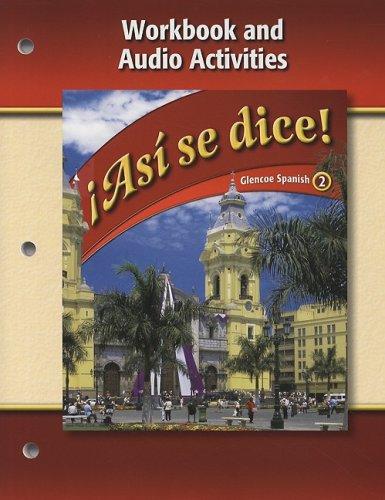
All Solutions
Page 6: Gramática
We are given *a*. this morning and *b*. every morning, according to the tense of the sentence which is the past simple, we will complete it with **a. this morning**.
Fui al supermercado **esta mañana**.
*(I went to the supermarket this morning)*
We are given *a.* yesterday and *b.* each year, according to the tense of the sentence which is in the imperfect form, we will complete it with **b. each year.**
Me compraba una traje nuevo **cada año**.
*(I bought me a new suit each year)*.
We are given *a*. last night *b*. every night, according to the tense of the sentence which is the imperfect form, we will complete it with **b. every night**.
Se comunicaban por correo electrónico **todas las noches**.
(*They communicated by email every night.)*
We are given *a*. last Saturday *b*. every Saturday, according to the tense of the sentence which is the imperfect form, we will complete it with **a. last Saturday**.
Vimos una película **el sábado pasado.**
*(We saw a movie last Saturday.)*
We are given *a*. today *b*. almost always, according to the tense of the sentence which is the imperfect form, we will complete it with **b. almost always**
Pagaba con tarjeta de crédito **casi siempre**
*(I paid with a credit card almost always.)*
We are given *a*. yesterday *b*. everyday, according to the tense of the sentence which is the imperfect form, we will complete it with **b. everyday**
Vendían frutas frescas **todos los días**.
*(They sold fresh fruits everyday.)*
We are given *a*. the last summer *b*. every summer., according to the tense of the sentence which is the imperfect form, we will complete it with **b. every summer.**
Íbamos a la playa **todos los veranos**
*(We went to the beach every summer.)*
We are given *a*. yesterday afternoon. *b*. every afternoon, according to the tense of the sentence which is the imperfect form, we will complete it with **a. yesterday afternoon.**
Mandé un e-mail **ayer por la tarde.**
*(I sent an email yesterday afternoon.)*
We are given *a*. today *b*. frequently, according to the tense of the sentence which is the imperfect form, we will complete it with **a. today**
El tren llegó **hoy**.
*(The train arrived today.)*
According to the context of the sentence, we will choose **llamaba** (called) which is the imperfect preterite of the indicative, because the subject of the sentence is *he*, and is the one that makes most sense.
Él siempre me **llamaba**.
*(He always called me.)*
According to the context of the sentence, we will choose **hablábamos** (talked) which is the imperfect preterite of the indicative, because the subject of the sentence is *We*, and is the one that makes most sense.
Nos **hablábamos** todos los días.
*(We talked to each other every day.)*
According to the context of the sentence, we will choose **llamé** (was calling) which is the preterite of the indicative, because the subject of the sentence is *I*, and the form **contestó** (didn’t answer) which is the preterite of the indicative of third-person singular.
El otro día yo lo **llamé** pero no **contestó**.
*(The other day I called him but he didn’t answer.)*
According to the context of the sentence, we will choose **pregunté** (asked) which is the preterite of the indicative, because the subject of the sentence is *I*, and the form **contestaba** which is the imperfect preterite of the indicative of the third-person singular.
Yo le **pregunté** por qué no **contestaba**.
*(I asked him why he didn’t answer.)*
According to the context of the sentence, we will choose **dijo** (told) which is the imperfect preterite of the indicative, because the subject of the sentence is *he*, and the form **oyó** (didn’t hear).
Él me **dijo** que no **oyó** el timbre.
*(He told me he didn’t hear the bell)*
Note that in this case, the options in English are both translated the same.
Sí, yo lo llamé.
*(Yes, I did call him)*
Sí, suelo llamarlo dos veces a la semana.
*(Yes, I usually call him twice a week)*
Sí, fue su madre quién contestó el teléfono.
*(Yes, it was her mother who answered the phone)*
Sí, ella contestaba casi siempre.
*(Yes, she answered most of the time)*
Ustedes visitaban los Alpes suizos con frecuencia.
*(You visited the Swiss Alps frequently)*.
Una vez yo tomé un autobús sin rumbo fijo.
*(Once I took a bus aimlessly)*.
Mi familia siempre se reunía en la época navideña.
*(My family always got together around Christmas time).*
Mis primas de vez en cuando iban juntas de paseo al parque.
*(From time to time my cousins went for walks together in the park)*.
Ellas visitaron París el año pasado.
*(They visited Paris last year)*.
Nosotros hablábamos por teléfono todos los días.
*(We talked on the phone every day)*
Mis padres y yo vimos una película anoche.
*(My parents and I watched a movie last night)*.
Tú me llamaste el sábado pasado en la noche.
*(You called me last Saturday night)*.

